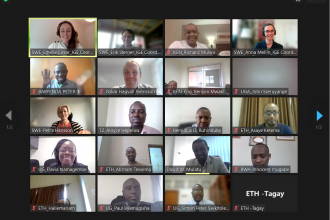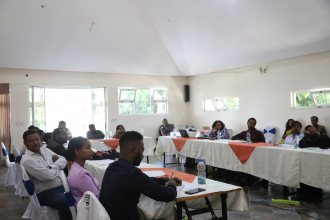
Uganda’s IGE fellows, cohort 2023 inaugurated
Uganda’s participants in the Inclusive Green Economy (IGE) in practice program 2023/24 have been introduced at a function held at Makerere University. This cohort will focus on the problems related to…

Uganda’s participants in the Inclusive Green Economy (IGE) in practice program 2023/24 have been introduced at a function held at Makerere University. This cohort will focus on the problems related to…
Most energy models used for policy analysis are too complex for non-experts. We propose an energy model and demonstrate how non-experts can employ it to understand and evaluate renewable energy policies. The model has a game-like user interface, known as a microworld, made accessible to a broader range of users, allowing them to interact directly with the model without needing a specialist, enhancing the user's comprehension of the regulatory options for renewables.

EfD Ghana hosted a horizon-scanning workshop to discuss the developments and challenges within Ghana's environment and natural resource sector. The workshop served as a platform for researchers and…
Abstract
Demand-side management of energy consumption using energy efficiency improvements has the potential to reduce poverty in addition to reducing greenhouse emissions. However, very little is known about the impact of electrical energy consumption inefficiency on poverty.
Using data from a household survey and the Ordinary Least Square estimation technique, we first assess the impact of household electricity consumption efficiency on multidimensional poverty using a stochastic energy demand frontier model.

80 participants from around the world met online on June 15 and 16 at The Eighth Annual Meeting of the Sustainable Energy Transitions Initiative (SETI). The event included ongoing studies and the…

A new group of participants in the Inclusive Green Economy in Practice program, so-called IGE Fellows, met for the first time with the country support teams on June 21. The fellows, who are civil…
SETI Related Event at the EAERE 2023 Annual Conference A sustainable and inclusive energy transition is key in countries of the Global South to increase people’s well-being, improve and develop a…
This brief is based on results from the study Impact of energy access on food security and child nutrition: panel data evidence from rural Ethiopia, EfD Discussion Paper 22-11, June 2022, by Tagel Gebrehiwot and Sied Hassen.

EfD Ethiopia conducted a second dialogue workshop on sustainable energy transition, focusing on biomass dependency on Friday 2 June 2023. The objective was to narrow down the number of policy options…

Abebe D. Beyene, a senior research fellow at ECRC, conducted a training workshop on the economic and social benefits of clean cooking stoves for media professionals. It was organized by the Ethiopian…